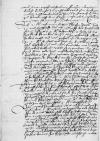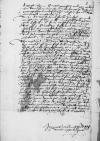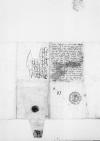Die gnad, fried und barmherczigheit, die mir Ew(e)r F(urstliche) D(urchlauch)t vonn(n) Gote, dem(m) hymlischen vater(r), und ⌊Ihesu Chr(ist)o⌋, unserm(m) seligmacher, im negsten(n) ⌊⌋ egener hanth thet wunschen, / bitt ich armer sunder widerum(m)b Got, u written over ...⌈... illegible⌈...... illegible⌉uu written over ...⌉n(n)sern hymlischen(n) vater, und seinen(n) einygen(n) son Ih(es)um Chr(ist)um, das her in seiner bar(m)herczigheit seine gotliche gnad und fried von E(wer) D(urchlauch)t in ewigheit nicht thu abwenden(n) mit erbittung meyner willigen, freuntlichen(n) dinsten E(wer) D(urchlauch)t zuvoran(n). / Wie lieb unn(n)d angenem mir E(wer) D(urchlauch)t schreiben(n) ist gewest, / dar aus ich, / das E(wer) D(urchlauch)t in gutter gesuntheit / und alles noch willen ausgericht, / vorstanden(n), heim sey komen(n), / kan ich mit schreiben(n) nicht ausbreiten oder von mir geben(n). / Dem almochtigen(n) Gote sey lob, / ehr(e) und danck, / und losse der gesuntheit E(wer) D(urchlauch)t biss zu langen, alten(n) tagenn(n) in aller glukseligheit genissen(n) / und fure die hendel, / durch E(wer) D(urchlauch)t angefangen(n), / zu frolichem(m), begertem(m) ende, am(en). Das E(wer) D(urchlauch)t uff mein(n)er ⌊svester⌋ man, den h(e)rn ⌊doctor Reinck⌋, / seines(?) ausbleibens halben(n), / so das auch mit seiner schuld nicht geschenn(n), / kein unwillen(n) trag(en), thu ich mich gen E(wer) D(urchlauch)t hochlich bedancken(n), / in und mein svester in E(wer) D(urchlauch)t gnad befelend. / Wie E(wer) D(urchlauch)t anczeigt, / iren eigenen(n) boten gen(n) ⌊Peterkau⌋ uff den ⌊tag⌋ / an meynen(n) gunstig(en) h(e)rn und freundt, den h(e)rn ⌊bischoff von Kraka⌋, geschickt hab, / bin ich bericht, / sein lieb seiner gesuntheit halben zu beshonen(n), / uff gedocht(en) tag on the margin⌈tagtag on the margin⌉ von ⌊Krako⌋ nicht komen werd / und sol do hin von Peterkau zu s(einer) l(ieb) der her ⌊bischoff vonn(n) Ploczko⌋, s(einer) l(ieb) svester son, / komen(n), / derwegen(n) ich II boten, / einen(n) gen Peterkau, / den(n) andren(n) den negsten noch Kraka gesend(et) und s(einer) l(ieb) ⌊⌋ alle das jenige, das ich / hab gewust, E(wer) D(urchlauch)t zu ehren(n), / willen(n) / und nucz gedeyenn(n) moe superinscribed⌈ee superinscribed⌉cht, / ouch s(einer) l(ieb) des jung(en) margraffenn(n) /  GStA, PK, HBA, C 2, No 84, f. 1v und seiner negst vorstorbnen furstin abconterfeit brust bildniss zu geschickt, / und sein beide gemelte recht und wol gethan(n), / und werd(en) leuten zu Krako uff dem slosse nicht ubel gefallen(n). / Werd(en) von dannen(n) in ⌊Litten⌋ geschickt etc.
GStA, PK, HBA, C 2, No 84, f. 1v und seiner negst vorstorbnen furstin abconterfeit brust bildniss zu geschickt, / und sein beide gemelte recht und wol gethan(n), / und werd(en) leuten zu Krako uff dem slosse nicht ubel gefallen(n). / Werd(en) von dannen(n) in ⌊Litten⌋ geschickt etc.
Das E(wer) D(urchlauch)t uff mein bitten(n) meister Jacob hoth zu mir geschickt, thu ich mich uff das hochste un(n)d fleissigste gen(n) E(wer) D(urchlauch)t bedancken(n). / Er hoth sich hie bey dem(m) kranken, darzu ich in gebraucht, allenthalben(n) recht und wol gehalten(n), / derwegen(n) ich in E(wer) D(urchlauch)t so hoch und fast in der selbtig(er) gnad thu befhelen(n), so vil als um(m)er von mir muglich, / fruntlich bittend, / wolt sein gnediger(r) her sein und seine alte tage mildiglich bedencken(n), nemlich das er in dem(m) newen hospital, wie im zugesagt, / der kranken(n) arczt mocht sein(n), / un(n)d nicht erwarten(n) der, / welchen(n) die erczste im gedochten(n) hospital nicht helffen(n) vormugenn(n) / und dornoch im zu handen(n) komen(n). / Ein solch(er) man(n), mit so gewisser kunst begobt / und in solchem(m) alter, ist wol zu halt(e)n. / Man(n) ouch manchem, der es bedorffend ist under E(wer) D(urchlauch)t, vil guts und hulff thun. / E(wer) D(urchlauch)t wolt in des und seiner(r) dinst loss(e)n genissen(n) etc.
Hiemit schicke ich E(wer) D(urchlauch)t ⌊Felixen(n) von Alten⌋ hant schrifft uber die fumffczig r(heinische) flor(in), / bittend, die wollet an h(er) ⌊Hansen(n) von Werden(n)⌋ mir zu guth vormachen(n), / do mit ich sie, / do hin sie gehoren(n), / mag fertigen(n). / Ist ouch unnoth meiner vorschrifft halben / an(n) ⌊kay(serliche)r m(aieste)t⌋ hoff / mir zu dancken(n), / so ich im vil grossern(n) E(wer) D(urchlauch)t vorphlicht etc.
Von(n) newen(n) zceitungen(n) weis ich dis mol nichts besunders. / E(wer) D(urchlauch)t ist unvorborgen(n) die rode, das ⌊Andre de Oria⌋ vetter sold ⌊Rhodis⌋ halt(e)n, von den ⌊Turken⌋ eingenomen(n). / Got gebe, dem(m) so sey. Wie es mit h(e)rn ⌊Lasski⌋ ein(n) gestalt hoth, / ist aus so viler zceitung, die geschrib(e)n und gesagth werden(n), / nichts entlichs. / Ich hoff des besten(n), / so er in Goth sein vortrawen(n) geseczt / und sulche straff, umb Goth vorschuldeth, bekenth, / wie disse ⌊⌋ mit  GStA, PK, HBA, C 2, No 84, f. 2r brengt. / Hot E(wer) D(urchlauch)t was gewissers / und wie es dem(m) vom Berenstein mit seinem(m) anhange in ⌊Behemen(n)⌋ ergangen(n) / und anders, das zu wissen czymet, / bitt, mir wolde mitteilen(n) etc.
GStA, PK, HBA, C 2, No 84, f. 2r brengt. / Hot E(wer) D(urchlauch)t was gewissers / und wie es dem(m) vom Berenstein mit seinem(m) anhange in ⌊Behemen(n)⌋ ergangen(n) / und anders, das zu wissen czymet, / bitt, mir wolde mitteilen(n) etc.
So in des von(n) ⌊Polencz⌋ stelle zur ⌊Eyle⌋ eyn ander amptman ist / von E(wer) D(urchlauch)t eingeseczt / und vom(m) vorigem befhel E(wer) D(urchlauch)t kein wissen(n) villeich tregt, / bitt ich, E(wer) D(urchlauch)t wold im befhelend schreiben(n), / das holcz zu meiner kirchen(n), vor eym jor geslagen(n), das zum thorm(m) komen(n) sol, / mir lossen(n) zu superinscribed⌈zuzu superinscribed⌉ folgen(n) / und sich nachparlich gen mir zu halten(n), welchs ich um(m)b E(wer) D(urchlauch)t gern(n) wil beschuldenn(n) etc.
Wie mich ouch E(wer) D(urchlauch)t iren beichtvatter(r) im schreiben nenth, / ist mir fast lieb. / Wil mich mit der buss, / so es do hin gelanget, / gen E(wer) D(urchlauch)t nicht besverlich halten(n). / Es geburth ouch eym beichtvatter seinen beichtson zu warnen(n) und veterlich zu ermanen(n), / ouch so vi written over m⌈mvivi written over m⌉l muglich / vor schad(en) zu behutten(n). / Dieweil dan(n) die widertauff und die jenigen, / die vorlossend das wort Gots / dem(m) heiligen sacrament des waren leichnams unsers h(e)rn ⌊Ih(es)u Chr(ist)i⌋ / nichts, dan das broth und ein czeichen zu egenen(n) / vorhanden(n) / und uffentlich gespurt / werden(n), / thu ich, wie ein(n) beichtvatter, E(wer) D(urchlauch)t veterlich und fruntlich bittenn, / wold d. v.(?) sein / und nicht noch geben(n), / das solch(e)r uncristlichr irtumb hie bey uns in dissenn(n) landen E(wer) D(urchlauch)t erwuschsse und sich aus breyte. / Dan so solch wesen hie sold einreissen(n), / hot E(wer) D(urchlauch)t mit seinem(m) hohen furstlichen(n) vorstandt zu ermessen(n), / was unbekuemigheit, / ouch uff rur mit der zceit daraus sich mocht begeben(n). / Dis hab ich so E(wer) D(urchlauch)t, in der gunst ich mich thu befelen(n), / wie ein angenomener beichvatter(r) vortraulich(e)r und fruntlicher weis nicht mocht bergenn(n) etc.
 GStA, PK, HBA, C 2, No 84, f. 2v
GStA, PK, HBA, C 2, No 84, f. 2v  GStA, PK, HBA, C 2, No 84, f. 1r
GStA, PK, HBA, C 2, No 84, f. 1r  GStA, PK, HBA, C 2, No 84, f. 1v und seiner negst vorstorbnen furstin abconterfeit brust bildniss zu geschickt, / und sein beide gemelte recht und wol gethan(n), / und werd(en) leuten zu Krako uff dem slosse nicht ubel gefallen(n). / Werd(en) von dannen(n) in
GStA, PK, HBA, C 2, No 84, f. 1v und seiner negst vorstorbnen furstin abconterfeit brust bildniss zu geschickt, / und sein beide gemelte recht und wol gethan(n), / und werd(en) leuten zu Krako uff dem slosse nicht ubel gefallen(n). / Werd(en) von dannen(n) in  GStA, PK, HBA, C 2, No 84, f. 2r brengt. / Hot E(wer) D(urchlauch)t was gewissers / und wie es dem(m) vom Berenstein mit seinem(m) anhange in
GStA, PK, HBA, C 2, No 84, f. 2r brengt. / Hot E(wer) D(urchlauch)t was gewissers / und wie es dem(m) vom Berenstein mit seinem(m) anhange in 


